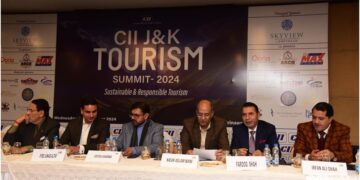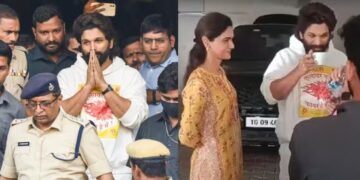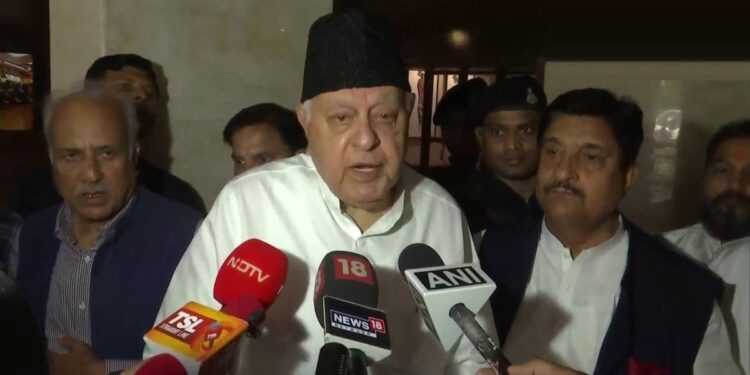Srinagar: Ahead of the assembly election results, the Farooq Abdullah-led Jammu and Kashmir National Conference (JKNC), widely expected to become the largest party, denied rumours on Friday, October 4, that it was in talks with the Bharatiya Janata Party (BJP) to form the government in Jammu and Kashmir.
In a statement, the party called the accusations “baseless”. “JKNC categorically denies the unfounded rumours of ‘back channel’ talks with any party outside the INDIA Bloc. Those sensing their impending defeat have resorted to spreading such baseless accusations,” the statement read.
“We urge the public, who have placed their trust in us, to disregard these false claims and not be swayed by rumour-mongering,” the statement added.
Political analysts believe that the saffron party was unlikely to ally with the JKNC, given that Prime Minister Narendra Modi and senior central ministers as well as J&K BJP leaders led a charged election campaign on the plank of keeping the ‘dynastic’ parties – JKNC, Congress and Peoples Democratic Party (PDP) – out of power.
Modi and Union home minister Amit Shah consistently blamed the “three families” for the problems of Jammu and Kashmir.
However, it must be noted that ahead of the 2014 assembly elections in J&K, the People’s Democratic Party (PDP) had also based its campaign on keeping the BJP out of Jammu and Kashmir.
Later, the party founder, late Mufti Mohammad Sayeed, formed a coalition government with the saffron party and justified it by saying that the ‘North Pole-South Pole’ alliance was in the “larger interest” of Jammu and Kashmir.
The JKNC statement followed that of Junaid Mattu, former mayor of Srinagar, who claimed on Thursday that Farooq Abdullah had held talks with the saffron party in the south Kashmir resort of Pahalgam.
“Which BJP representative did Dr Farooq Abdullah meet at Pahalgam not once but twice? What negotiations are being held in Pahalgam? What happened to all the stentorian rhetoric of BJP being forbidden and prohibited? The more that things change, the more they remain the same,” Mattu posted on X, formerly Twitter.
After a netizen questioned Mattu about the authenticity of the ‘rumour’, Mattu shot back, “Rumours? The NC-BJP negotiations have happened in Pahalgam headed by Dr. Farooq Abdullah himself — accompanied by the ‘apolitical’ mediators. Let NC deny this, I’ll be happy to share the names, details, venue and times of the two meetings.”
Mattu, who started his political career with JKNC in 2009 and later joined J&K Peoples Conference (JKPC) led by former separatist Sajad Lone in 2013, hadn’t shared the names and details of the parleys when this report was published.
A year after the BJP-led Union government revoked the special status of Jammu and Kashmir, Mattu quit the JKPC in 2020 and joined the newly floated J&K Apni Party led by businessman-turned-politician Altaf Bukhari, who is also a BJP ally.
The Election Commission of India (ECI) has banned the broadcast of exit polls on the J&K assembly election before 6 pm on October 5 but there are widespread speculations that the Congress-led INDIA bloc is going to emerge as the single largest coalition in the Union Territory.
The BJP is expected to win a majority of seats in Jammu, the Hindu heartland of J&K, but is unlikely to make any major gains from its 2014 assembly election tally of 25 seats.
The saffron party, which ran a polarised election campaign, promising to give Jammu and Kashmir its first Hindu chief minister, is hoping that its allies in the Kashmir Valley can win at least 10-15 seats that could help it to stake a claim to form the next government.
Speculations are also rife that the INDIA bloc could fall short of getting a majority in the house of 90 members which will force it to look for allies in Kashmir Valley.
The Union government has empowered J&K’s lieutenant governor to nominate five members to the legislative assembly that could turn the tide in favour of the BJP when the political parties stake claim for government formation.
The result of the three-phase J&K assembly election, which recorded a low turnout as compared with the 2014 assembly election, will be declared on October 8.





















